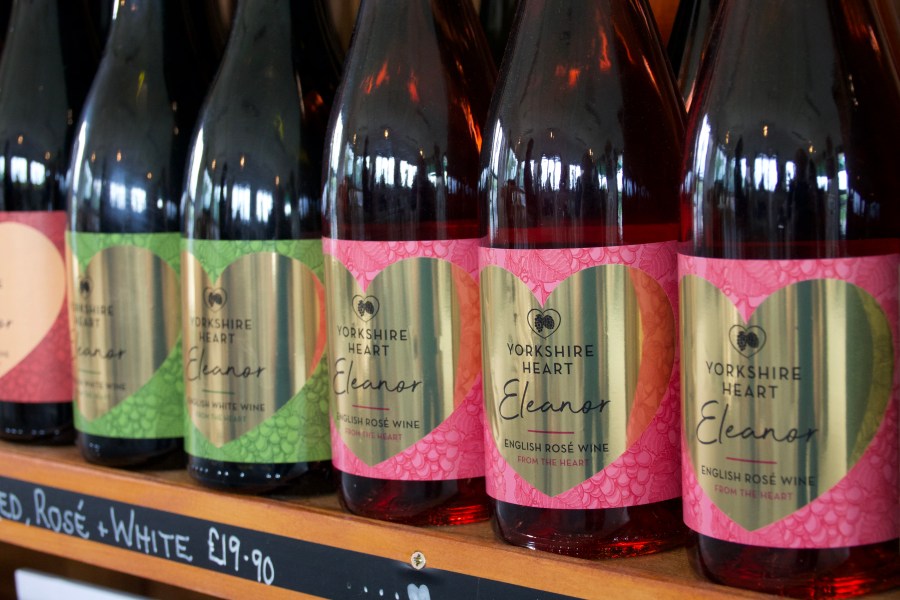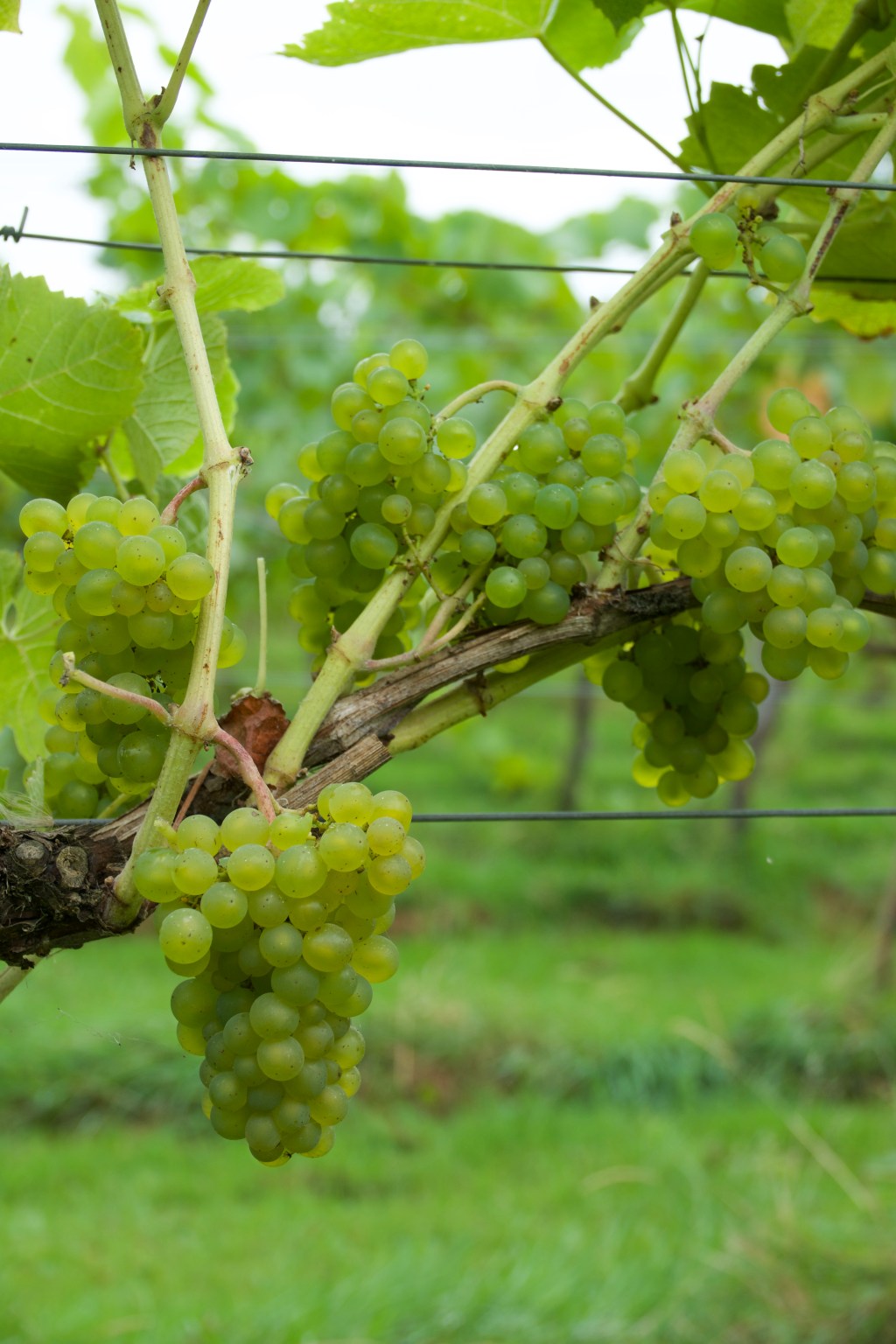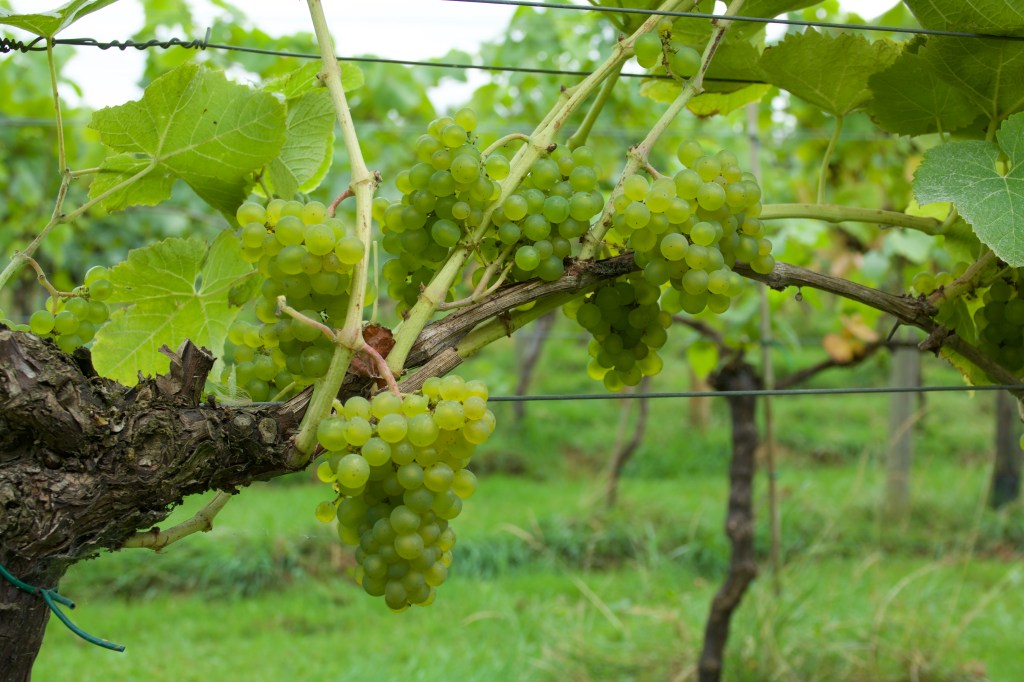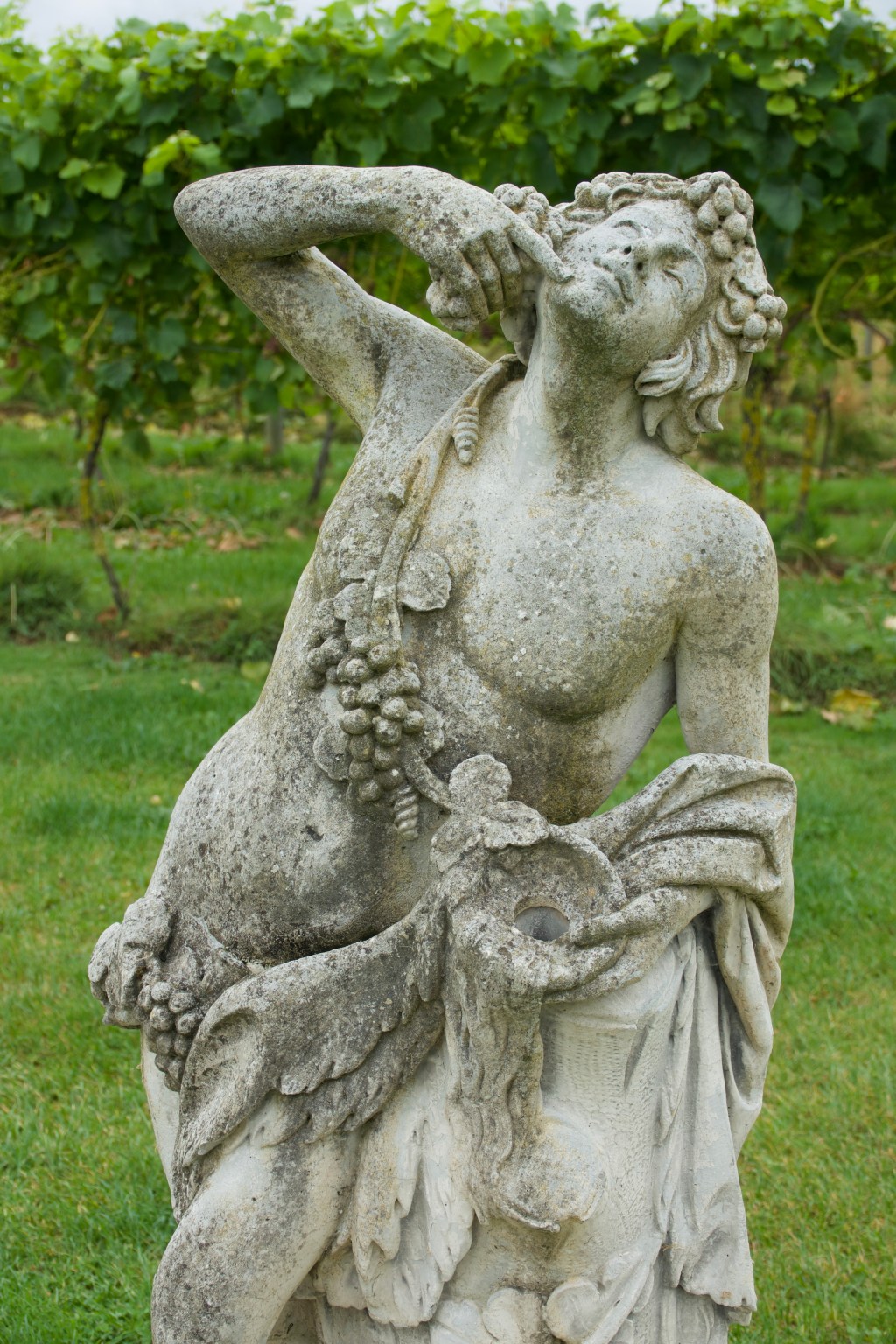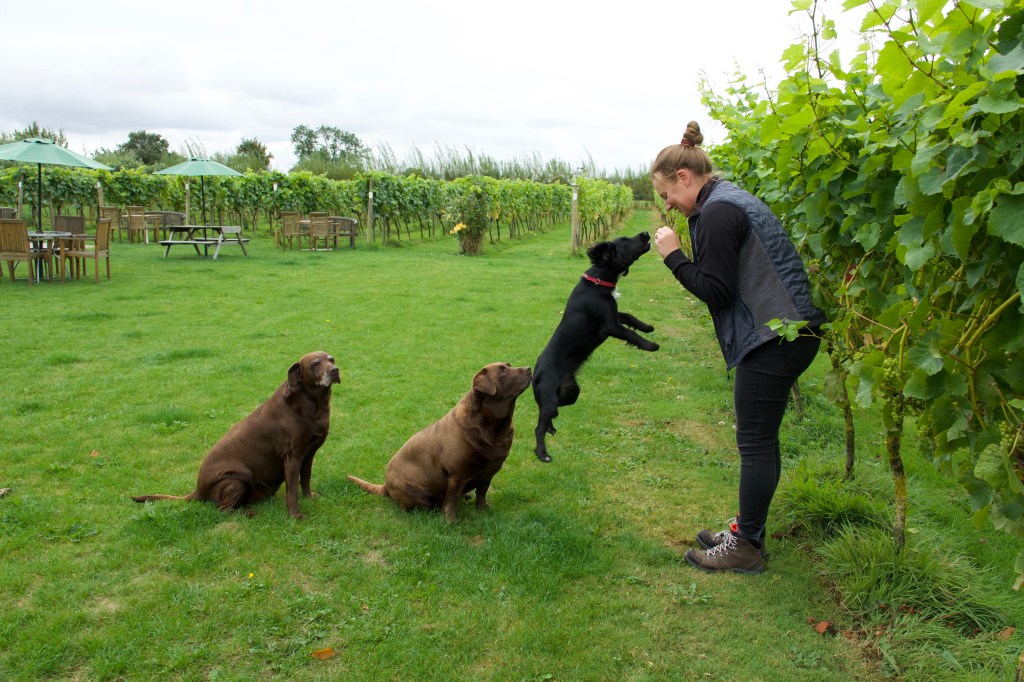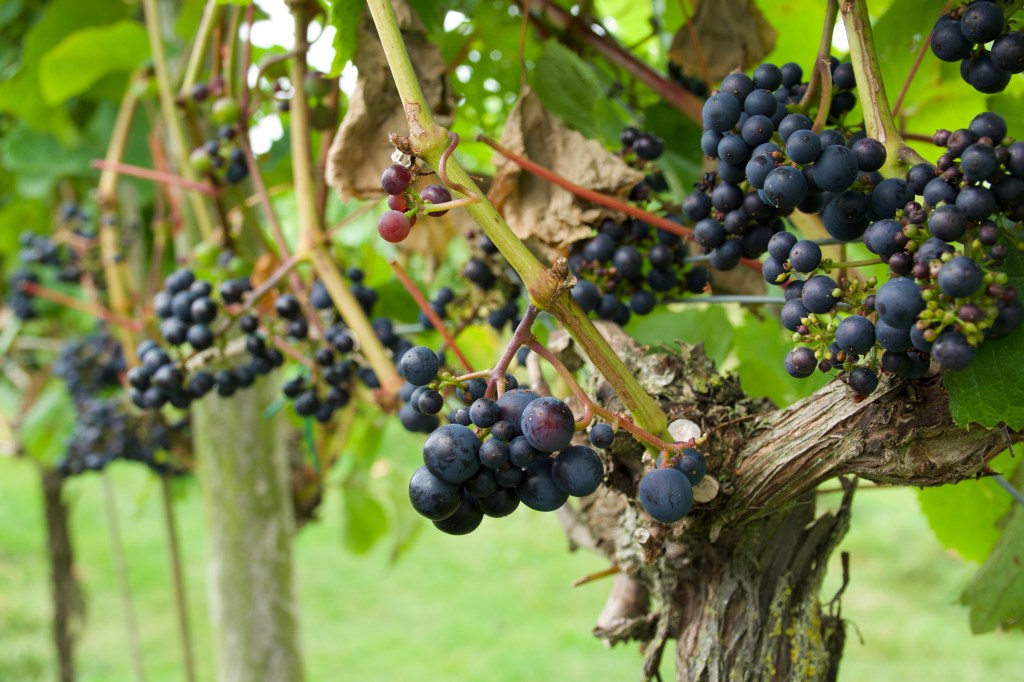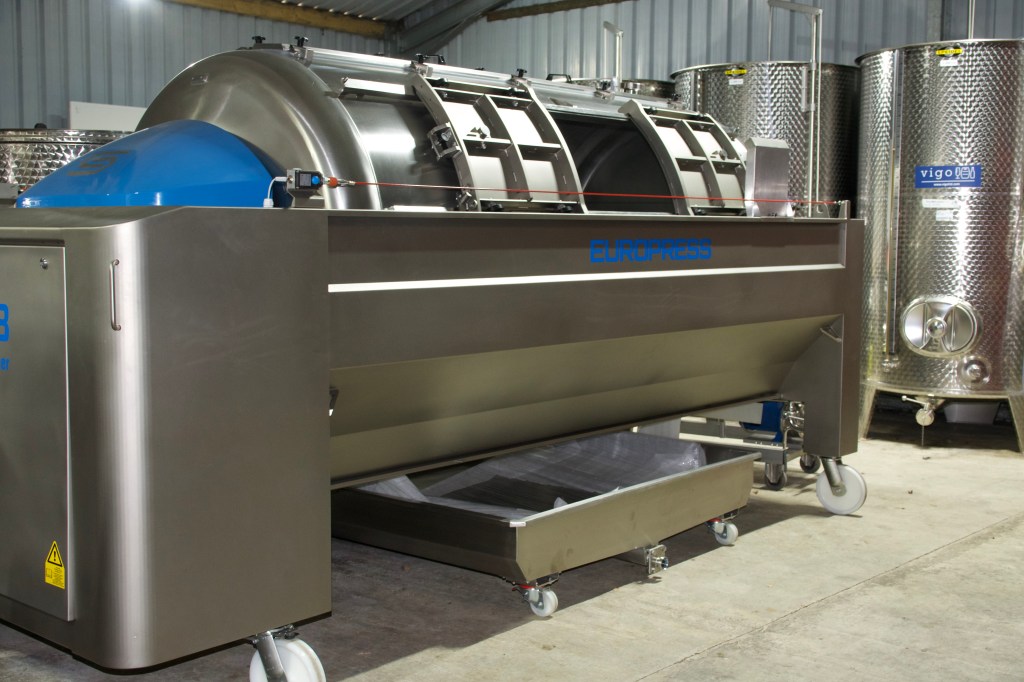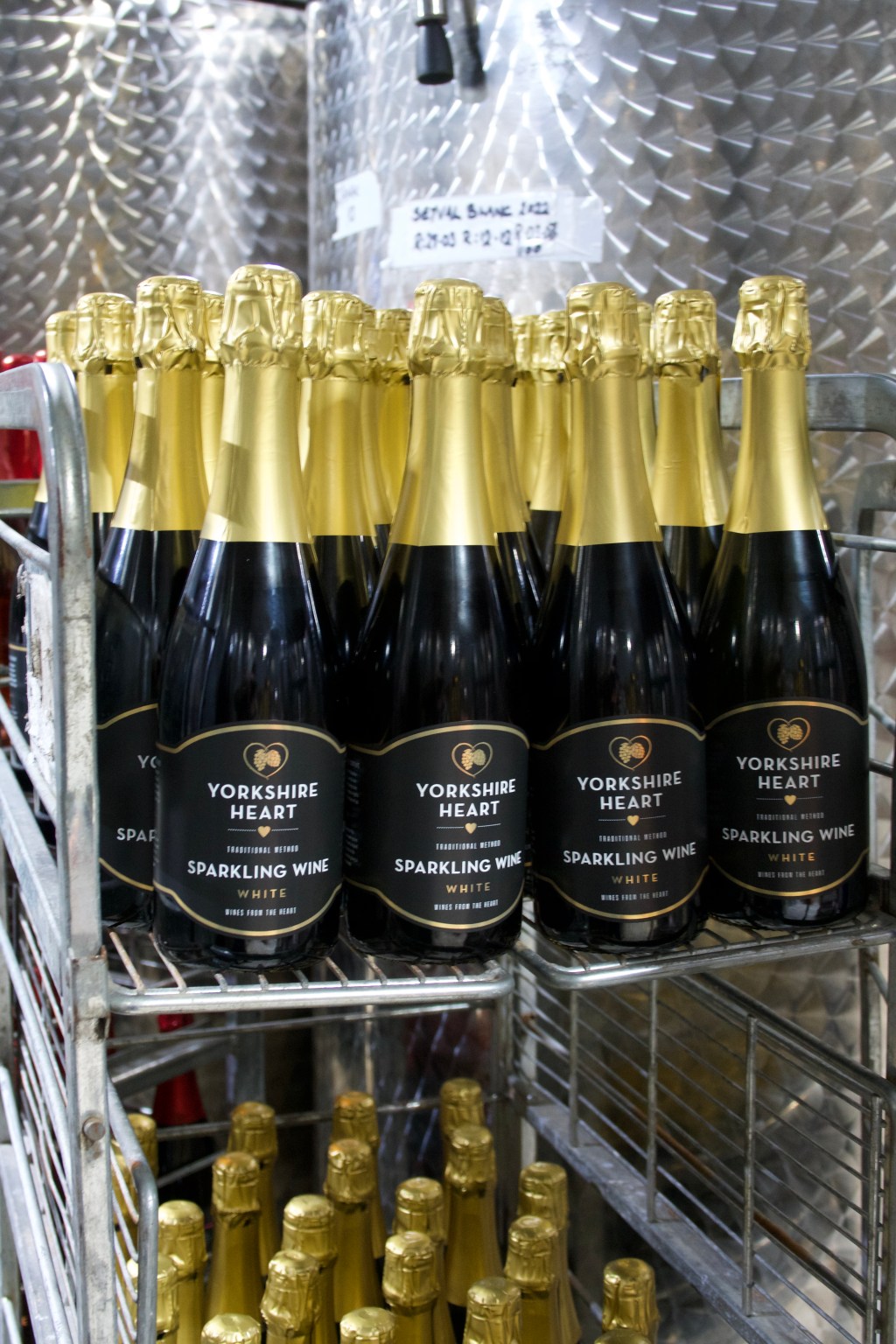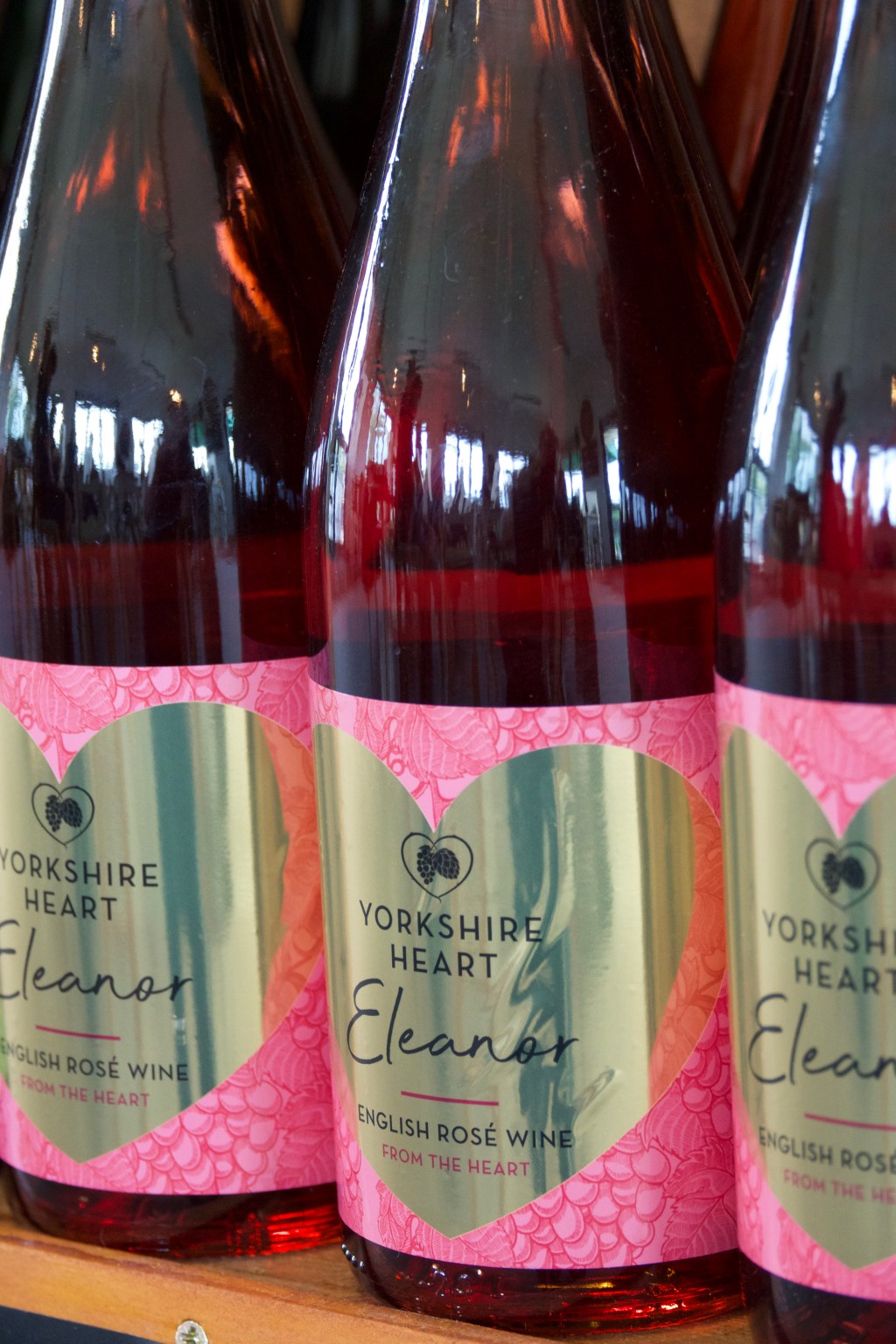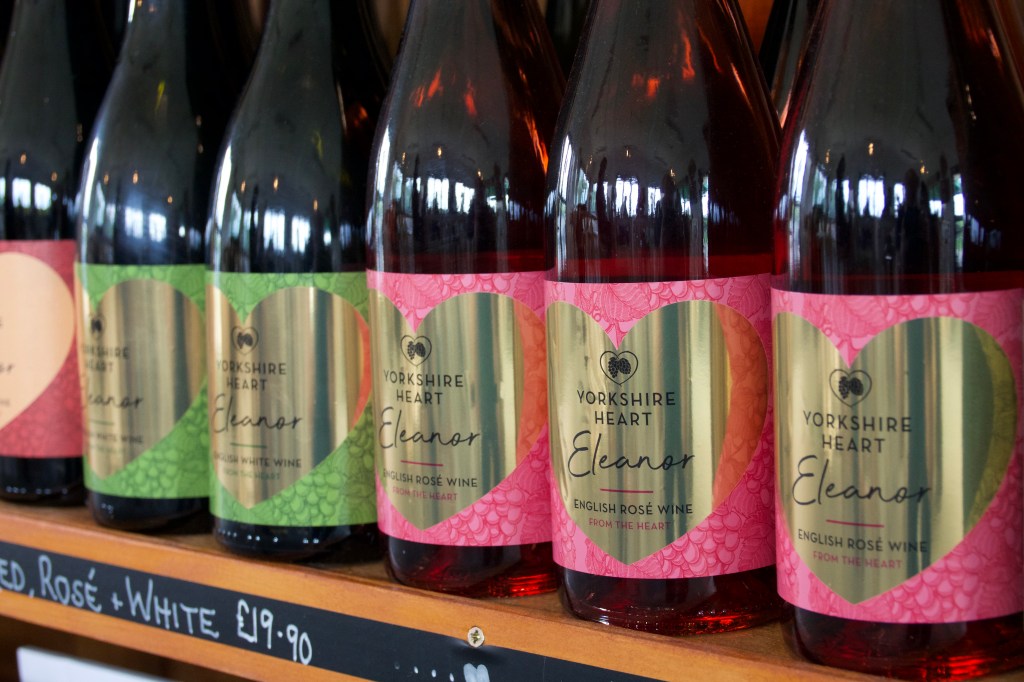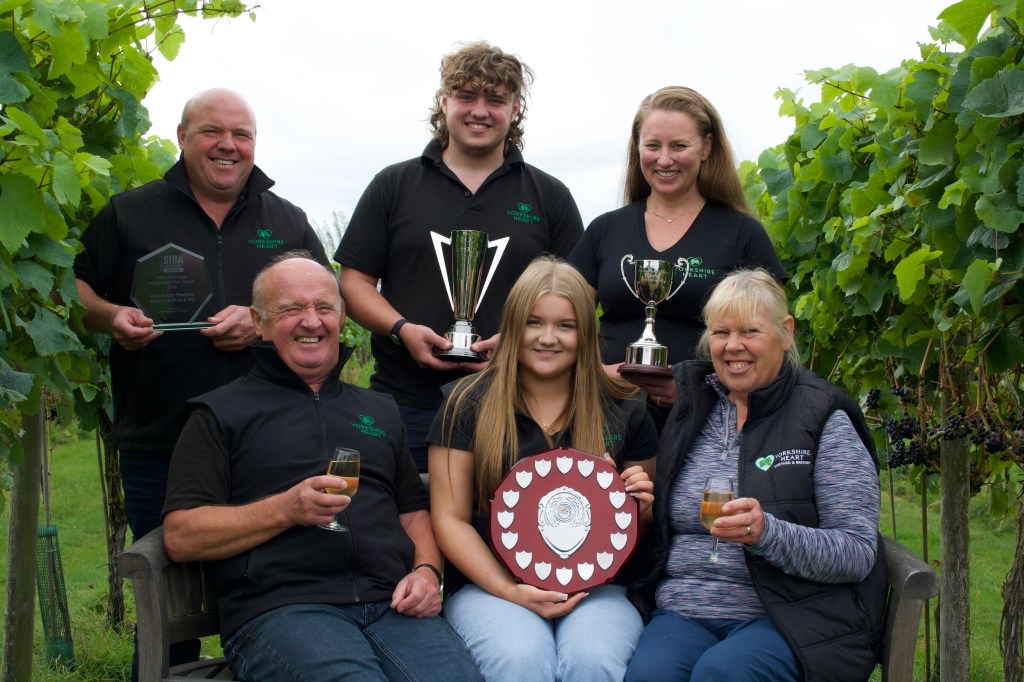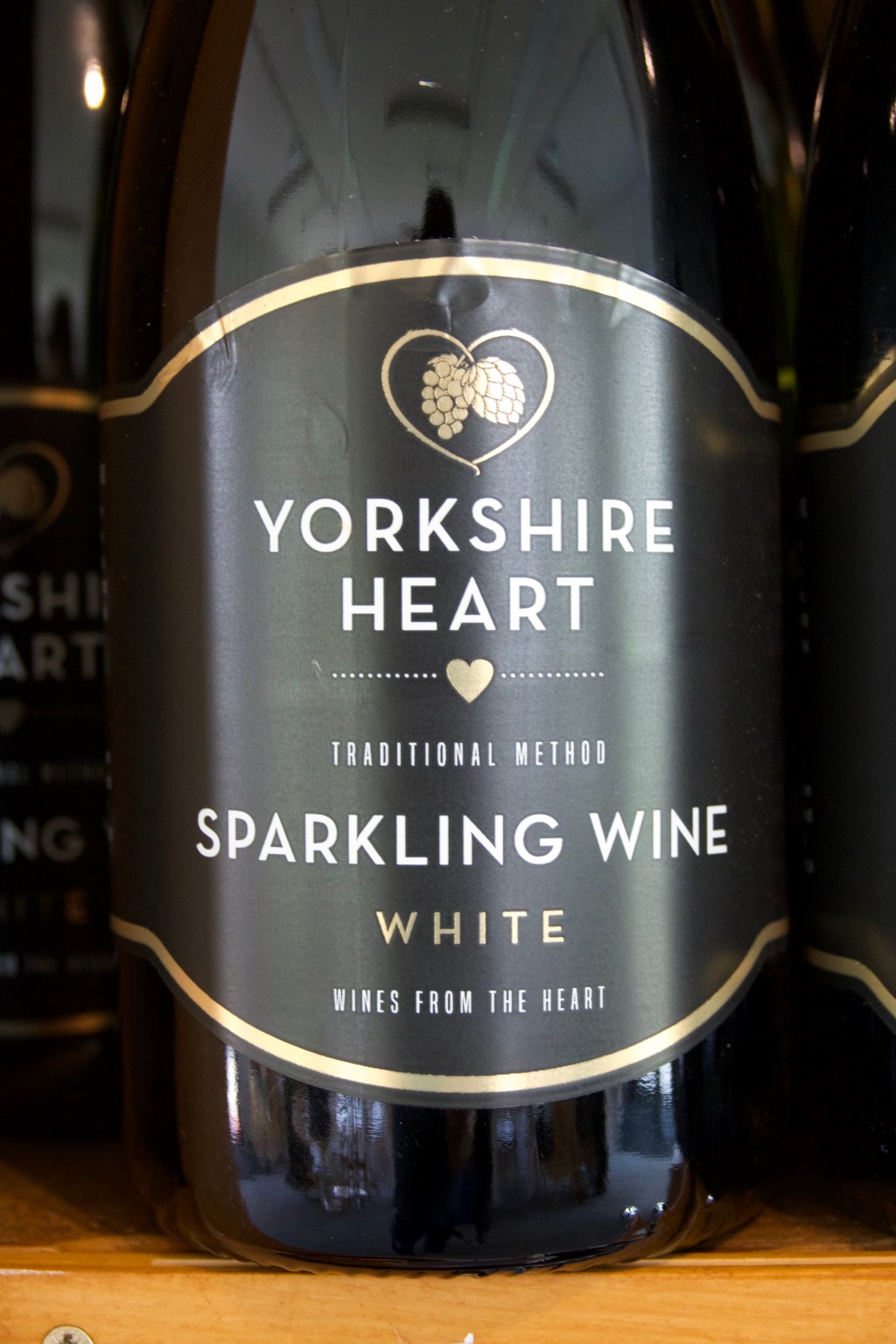Like the nearby city of York with the Jorvik Viking centre, the York Minster and the National Railway Museum this vineyard is a fascinating blend of ideas and the results are remarkable.
The vineyard café and shop is situated in the centre of the vineyard so visitors are literally surrounded by the well established flourishing vines. There are currently 26,000 vines covering 15 acres at Yorkshire Heart however this vineyard which is approaching it 20th year started small and has grown from initial inspiration to the thriving vineyard and winery that greets thousands of visitors each year.
Chris and Gillian Spakouskas originally planted 35 vines in their garden but in 2006 they decided to expand their hobby into a commercial vineyard and the first commercial vines were planted at Yorkshire Heart.
Gillian explained: “My family had a dairy farm and we took on the milk delivery business.” This work started at midnight and finished in the early morning so it gave Chris and Gillian daylight hours in which to plant those first vines. Their Son Tim and his wife Georgina were also there to lend a hand with the establishment of the first parcel of vines. “We still see customers from those days on the milk round and I can remember that they used to order two pints of semi skimmed,” said Gillian with a warm smile.
Gillian pointed out that in those early days she and Chris were also given much emotional support by their own parents. “My dad was so supportive and he was always happy in the vineyard but he could often be found eating the produce,” she said. Providing the confidence to reach out and try something new is a wonderful gift that parents and grandparents can give to future generations.
Tim and Georgina have two children Henry and Eleanor. Henry has recently completed a viticultural apprenticeship at Plumpton College. Talking about his experience it is clear that Henry gained confidence not just from the educational side of the course but also from the experiences of other students and has made lifelong friends within the industry. “I would like to travel and experience some vintages in different countries,” he said with enthusiasm.
“I think every vineyard should consider working with the apprenticeship scheme,” Chris added.
Working together as a family team may present some challenges but during the day of the visit the harmony between the close-knit group is so evident they almost finish each other’s sentences but still maintain a knowledgeable control over their own specialist area. This working balance seems effortless at Yorkshire Heart and leaves a deep impression of just how successful a family business can be.
Gillian is the head winemaker and current production sits at between 35,000 and 45,000 bottles a year. The wines are available direct from the vineyard but are also sold in farm shops and in local restaurants. Yorkshire Heart also have an award winning Brewery business with deliveries being made three to four times a week. With a nod to the innovation that is on display across the business, Yorkshire Heart Brewery produce Pinot Porter, a barrel aged beer that utilises the oak barrels from the winery.
The local community is very important to Yorkshire Heart “there is a big enough market so local people can have local produce,” said Gillian. This is in evidence as the family discuss their plans for the upcoming harvest. “We have volunteer pickers most of whom come every year, it is a real community effort,” said Chris with warmth in his voice.
The name Yorkshire Heart was inspired by the location of the vineyard, so close to the exact centre of this wonderful county in the north of England but it is clear that the entire family have a deep passion for growing grapes and producing wine that reflects this unique part of England. Chris does offer another origin of the name, “Gillian is from Yorkshire and I am all heart,” he jokingly said. Chris also recounts a tour on which a group from Lancashire renamed the vineyard simply Heart.
The site is beautifully adorned by lines of mature trees. These not only add beauty to the site but serve as a wind break from the westerly winds. “The Vale of York is very flat and the wind can gather a lot of speed so hedges and trees are used to prevent wind burn of the vines,” said Chris.
When attention turns to the unique challenges of managing a vineyard in the north of England Chris is quick to highlight that it is a common assumption that the weather is a significant issue but Chris and Tim both agree that contrary to popular opinion weather conditions are favourable for grape production.
Georgina has a horticultural background and has scaled back her commercial work to take charge of the vineyard full time. The vineyard sits on an ancient lake bed and the soil is fertile so this requires a lot of effort “controlling vigour in the Solaris and Rondo and opening up the canopy can be a problem,” said Gillian. The vineyard has not suffered from SWD (“we put a no entry sign at the front gate,” joked Tim) nor is there much predation from birds or badgers but both Georgina and Henry point to a boom in the slug population during the 2024 season. This has been especially problematic on the Rondo with the loss of young shoots.
A theme that runs through all the decisions taken at Yorkshire Heart is forward planning. The business is looking not just to the new vines that will be planted next year but to the 19 acres that could be planted in the next decade. “We have grown the vineyard slowly over time because we wanted to really understand the industry as a business to ensure we made good decisions,” said Chris. “We use John Buchan as our agronomist, he actually came to visit our garden vines before we planted the commercial vineyard,” he added with a laugh.
One of the advantages for vineyards that grow slowly is the ability to incorporate lessons learned into the new plots and additional plantings. At Yorkshire Heart this has involved a change to the direction of the planting. Initially the vines were planted north to south in 2m rows but as knowledge has deepened it was suggested that an east to west planting would be better. “That presented a slight problem because we realised that east to west planting would require a 2.5m row if we were to avoid a shadow falling on the fruiting zone,” Chris said. “The vines planted east to west do produce slightly better quality fruit,” Gillian added. Another advantage is that the strong winds now blow along the rows so there is no post damage due to adverse weather.
“We have prepared a couple of hectares ready to plant vines in 2025,” said Chris but the varieties are still under discussion. There are already a vast number of varieties planted at Yorkshire Heart: Acolon, Albarino, Bacchus, Cabernet Cortis, Cabernet Franc, Chardonnay, Divico, Dornfelder, Gamay, Madeline Angevine, Ortega, Pinot Gris, Pinot Noir, Regent, Rondo, Siegrrebe, and Solaris.
This list contains a number of surprises such as Acolon. “It is a very nice vine, that grows well without the need for much control,” said Georgina. Henry too was enthusiastic about the diversity of varieties at the vineyard having worked with varieties such as Acolon at Plumpton. In recent years Acolon has been blended with Rondo to add a depth of fruit flavours to the wine.
“Cabernet Franc ripens properly about one year in three,” said Chris. What the future may bring for this variety is uncertain but a decade ago some growers would have said the same thing about Pinot Noir and yet many growers now harvest fully ripe Pinot Noir every year.
Some of the varieties are planted in small numbers this includes 100 Albarino vines that were planted in 2023. I ask what prompted this planting and Gillian replied: “We have always been told that we can’t do certain things here. Albarino was another one of those things we were told we could not do so we thought we would give it a try.”
Small parcels of vines have also prompted the purchase of a new press for the winery. The new Europress ordered at the Vineyard & Winery Show from the Itasca stand will allow the vineyard to make small run single varietal wines. This investment in new equipment is backed by the building of a new winery area which will double the space the winery currently has. Like the growth of the vineyard the winery too has grown slowly and organically with the new space and equipment meaning there are even more exciting wines on the horizon at Yorkshire Heart.
It is evident that the family team at Yorkshire Heart have embraced the idea of trying new things. Planting traditional if somewhat unusual varieties such as Albarino, Cabernet Franc and Cabernet Cortis has also been accompanied by Piwi plantings. Solaris was part of the initial vineyard planting in 2006. “Ripening earlier and using less inputs I really believe Piwi will become a big part of the wine world,” said Chris emphatically.
There are five wines at Yorkshire Heart that incorporate Solaris and they each showcase different wine styles. As was true in many vineyards across England and Wales 2022 produced a large harvest and this inspired the production of a Solaris Orange Wine. This skin contact white wine had recent success at the WineGB Midlands and North competition picking up the trophy for the best Orange Wine. Solaris is also used to produce a wild yeast low intervention wine. Post fermentation the wine was cleared using Bentonite and the resulting wine has a surprising 11% abv, “this is my favourite of the Solaris wines we make,” said Henry. Tim and his dad Chris enjoy the Latimer White which is a fresh fruity Solaris wine style. There is also Solara, a sweet wine made from Solaris and fortified with Yorkshire Heart Brandy. The brandy is made by Harrogate Tipple using Seyval Blanc base wine produced in the winery at Yorkshire Heart and is a great example of companies combining skills in order to produce something unique. With the family all taking part in blending “there is a wide range of palates for opinion and we are not making wine for one particular person,” said Gillian who favours the Winemakers Choice which is a Burgundian oak aged 100% Solaris wine.
The Latimer range includes single varietals with a red that is 100% Rondo and the 100% Solaris as the white. The name Latimer was chosen for this range because Latimer was the maiden name of Tim’s grandmother and the name Latimer also has a historical connection to the vineyard site. “The Latimer name also helps to keep continuity across the red, rosé and white when people may not be so aware of the Rondo or Solaris grape varieties,” said Tim. This is a valuable point. Winemakers can sometimes raise objections to newer varieties based on the lack of public familiarity with names such as Solaris and Rondo but Yorkshire Heart have created a named range that has inspired trust and the results have started to show. “On a busy Saturday the terrace can be full of people drinking a glass of Latimer red looking out on the Rondo vines,” said Chris. “People who come regularly are getting braver and more adventurous with their choices,” added Tim and Yorkshire Heart certainly have plenty of adventure on offer.
The diverse use of winemaking techniques combined with a desire to innovate (there has been a sparkling red produced for the last four years, a wine style that continues to divide opinion across the wine world) along with the 17 grape varieties provides endless possibilities at Yorkshire Heart. As favourite grape varieties are discussed this ethos becomes ever more apparent as Gillian expressed a desire to make a dessert wine from Siegerrebbe.
The enthusiasm Chris shows is contagious and it is encouraging to note that this attitude must rub off on the visitors that the vineyard welcomes throughout the year. Tim and Chris conduct tours up to three days a week during the height of the season and there are also some tours available to book throughout the winter. With the vineyard located at the very heart of a tourist region it is great to think of the domestic and international tourists that will be getting an informal education around the wide subject of English wine.
There is a campsite on the vineyard and this gives visitors the opportunity to get up close to the vines, wines, beers and spirits (Seyval Blanc base wine is used to create a brandy). Camping on site is possible in one of the luxury glamping tents or it is also possible for tents, camper vans, caravans and motorhomes to be accommodated in a field right next to the vines. The cellar door shop is available for the guests to be able to enjoy wines made at the winery from the very vines they wake up next to each day of their holiday.
This provision of accommodation has opened the way for the vineyard and brewery to provide a host of experiences including, Acoustic Music Nights and Evenings in the Vineyard with welcome drinks and canapes, a tour of the vineyard and winery and a three course meal. There is also The Hearty Festival which is an annual festival celebrating music and local drinks held over a three day period and for the first time in 2024 The Great Yorkshire Wine and Fizz Festival was held in conjunction with seven other Yorkshire vineyards. For couples and families being able to enjoy these English wine events without having to think about transport home and at a reasonable price is a distinct benefit that is seldom found elsewhere.
The youngest member of the family Eleanor has a red, rosé and white wine that bear her name. These wines are all blends with the red and rosé wine blending Pinot Noir, Gamay and Cabernet Franc and the white wine blending Ortega and Siegerrebe. I asked Eleanor if she intended to enter the family wine business and in a protective manner her grandfather Chris pointed out that there are not many 16 year olds who can answer that question. It was heartwarming to see the quality of love on which Yorkshire Heart is built; that is love for what they do and love for each other.
Yorkshire Heart is a place where family, wine, tourism and community really come together and the harmony that this creates is inspirational. Added to this is a surprising desire for constant innovation both in the vineyard and the winery and the overwhelming sense of making wine an enjoyable experience for everyone. It has often been said that the best wine is the one enjoyed with friends and everyone drinking Yorkshire Heart is in the very best of company.
- Reclaimed statue of Bacchus
- Molly
- Georgina with other members of the family, Molly, Jazz and Ruby
- Eleanor
- Back: Tim, Henry, Georgina. Front: Chris, Eleanor and Gillian
For more like this, sign up for the FREE Vineyard newsletter here and receive all the latest viticulture news, reviews and insight

